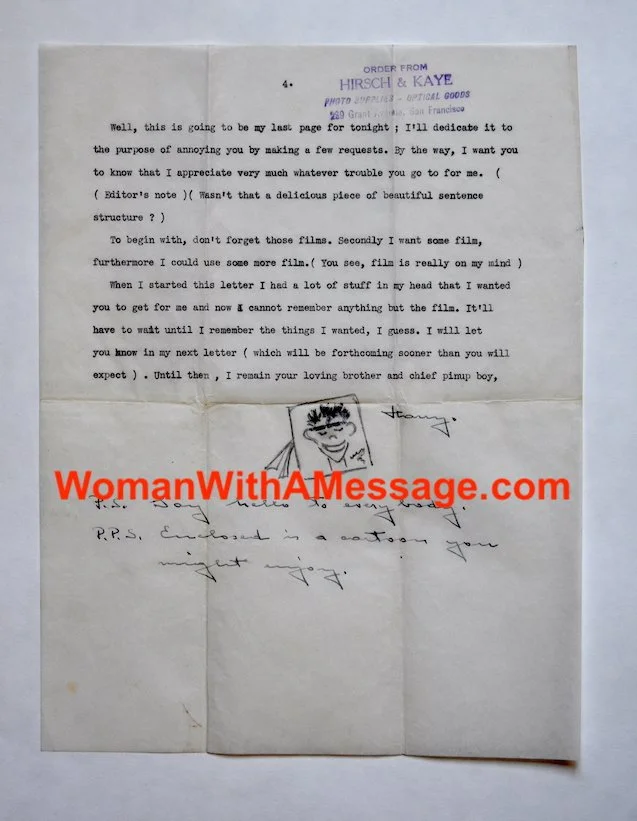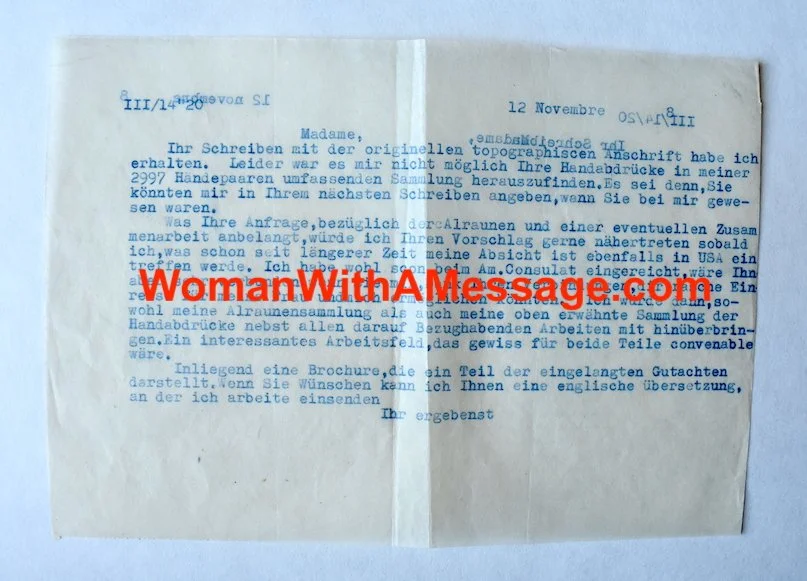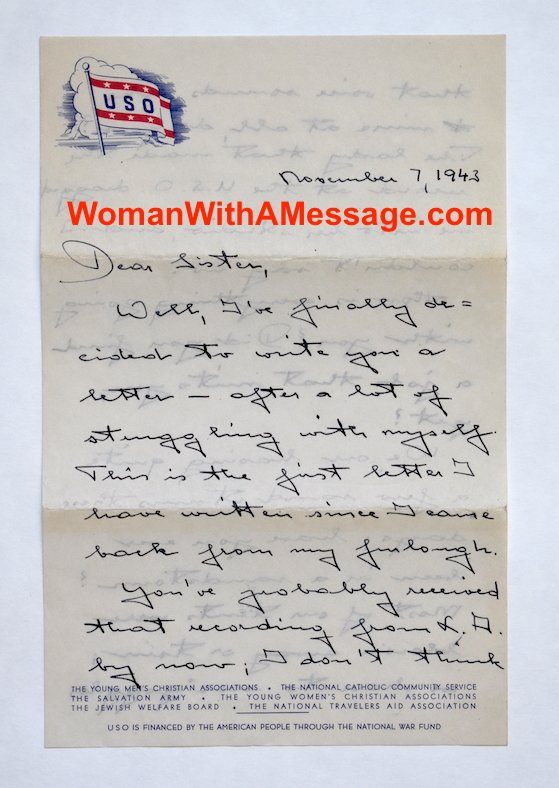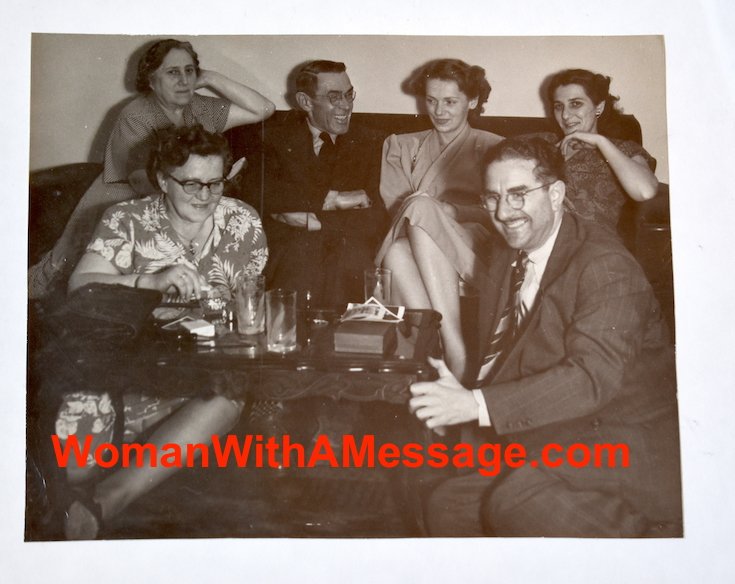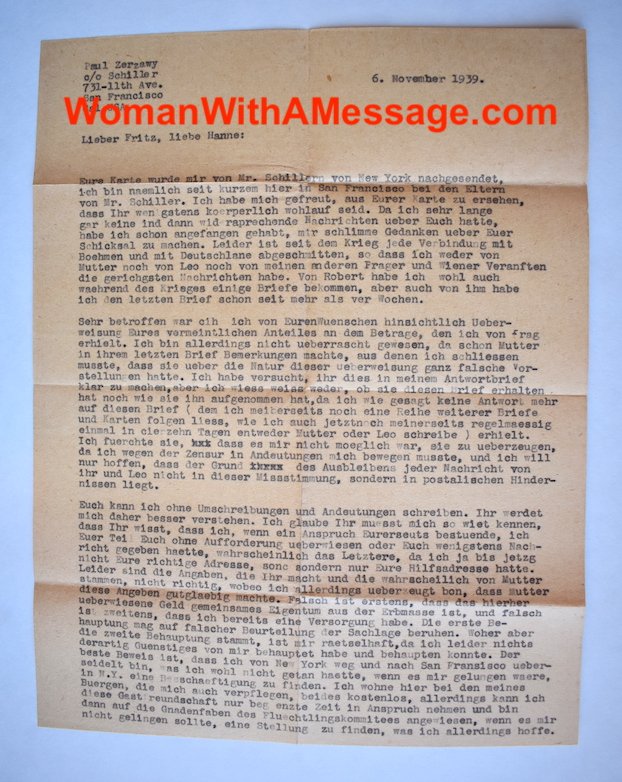Link to Family Tree to understand family relationships.
Today we have a letter from Helene in Vienna to her children in San Francisco. They are about to experience the first holiday season separated from one another.
Vienna, 8, Dec. 1939
My favorite children!
This is the 4th Clipper letter that I am writing to you, still hoping to get a direct answer from you. The eventful week continued. I wrote you in letter #3 that Olga fulfilled my request and sent it as soon as she received my card. The next day I received a second letter from her as an attachment that said it was undeliverable even though the address was exactly right. As a corpus delicti I would have liked to send it to you, but I’m afraid that letters with enclosures are harder to get through the censors. You can probably tell how I feel about this. I don't feel good about asking Olga to take on such expenses a second time, especially because I don't have the ability to pay her back right now and will hardly be able to do that from the allowed 10 reichsmark. So there is nothing left to do but put a smile on your face and wait until the post office decides to deliver the letters that have arrived.
In the meantime, it has become winter in Vienna, with snow, frostbite and other accessories. We don't have much to spend on food. We are lucky that we do have a card that allows us to buy clothing – our neighbors and acquaintances were not issued one – and I have already gotten the sewing materials I need. A hank of embroidery thread, blue cotton wool and a universal-colored darning wool. We can also buy vegetables nearby. I’m not used to going out, as you can maybe tell from the following incident. I go downstairs, intending to go shopping, taking the garbage can to empty at same time so that I only have to go out once and discover I forgot my grocery card. Annoyed at my forgetfulness, I put a hat on – the weather that day was too tempting – to make a little detour. When I wanted to buy something without coupons, I realized that instead of my shopping bag, I had the empty garbage bin hanging over my arm. Papa latest eloquence when we go out is: “Helene, did you remember the garbage pail?” The fact that I am just writing about garbage reflects my mental state and should not surprise you, given my current, exclusive occupation and the milieu in which we live. Papa, who used to bring home something of a spiritual atmosphere from his professional life, no longer throws clients out on his own initiative and for his own private enjoyment, but because he has to and that is less fun for him. Spiritually, we have gone to self-sufficiency, and my letters are a small example! How many minus points would I my jokes get now? Fortunately, I don't feel like it anymore.
Its Christmas in 14 days and I will to the extent possible think about you and hope you have a happy holiday. If you think about how nice it used to be, don’t be sad. You will spend these holidays under completely different circumstances - certainly very nice - and think that we will always be united in thoughts.
Papa is about to leave and I will get him to take this letter to the post office. Warm greetings to all of you. Many, many kisses
Mutti
[written upside down at top of letter:] All the best, Jo!
As I mentioned in yesterday’s post, my translation efforts began with the typewritten letters, because they were easy to decipher. Roslyn translated the letter we see today in March 2018 and the letter written on December 2, 1939 in November 2019.
Life is becoming increasingly challenging in Vienna. The balmy days of a few days before have given way to the chill of winter. Food and essentials are rationed and there appears no rhyme or reason as to who gets the valuable coupons and ration books. Their focus is on survival and not on the rich intellectual and cultural life they had before the war. Helene is distracted due to the absence of her children, as well as by the unfamiliar and unkind world her beloved Vienna has become. It sounds like Vitali is no longer allowed to see clients in their shop. It was something he enjoyed doing and he brought comfort to many people’s lives – but apparently he also enjoyed not helping people he didn’t like!
Below is a photo of Helene’s daughter Eva — we can imagine Helene sitting in Eva’s place working with the valuable materials they bought with their ration book.












